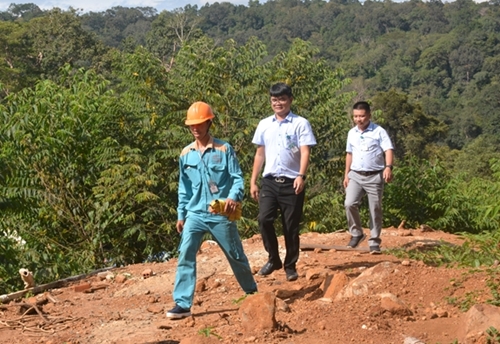With the responsibility of a military business, the Military Industry-Telecoms Group (Viettel) has exerted utmost efforts to bring telecoms services to every corner of the country with a special priority given to border areas. In particular, the business has tried to ensure that each border post has a base transceiver station (BTS), and all areas along the borderline have mobile coverage.
    |
 |
|
Viettel Networks Corporation’s cadres and engineers on the way to Dak No Border Post to check the operation of the post-based base transceiver station |
Part 1: Mobile services reach border areas
Lieutenant Colonel Nguyen The Hung, Commanding Officer of Dak No Border Post of the Binh Phuoc provincial Border Guard Command, recalled the day when Viettel brought mobile phone signal to the locality. When the first mobile phone signal appeared, everyone cheered and they immediately called their families and relatives. They were happy as if it was Tet (the Vietnamese people’s lunar New Year Festival).
As the situation in border areas is still difficult, Viettel’s mobile coverage has actively supported forces’ patrol to firmly protect security in border areas and served as a source of encouragement for troops to fulfill their missions.
The joy of receiving Viettel’s mobile signal
Starting from Dong Xoai city (Binh Phuoc province) and then following the border patrol path running along Bu Gia Map National Park, there are 2G and 4G BTSs built by the Viettel Network Corporation, a subsidiary of Viettel at Dak No Border Post. Located deep in the core zone of Bu Gia Map National Park, Dak No Border Post is tasked to manage and protect a border section with a system of border markers, which are among Binh Duong’s farthest border markers from the border patrol path.
Before the telecommunications infrastructure was put into operation, troops of Dak No Border Post had to walk 5km to Dak Ka Border Post to make phone calls.
The construction of the 42m-high BTS started in early July 2020. It was completed within a month, two weeks faster than usual. It is among the top BTSs with highest 4G data traffic in Binh Phuoc province, serving from 50 to 60 mobile subscribers.
On July 30, 2020, Viettel’s BTS at Dak No Border Post was officially put into use, bringing first mobile signal to the area. Lieutenant Colonel Nguyen The Hung still remembered the happiness of the border post’s personnel when receiving Viettel’s first phone services. He said, having learnt about the launch of the BTS, everyone had their phones ready to make phone calls. When the first signal appeared, everyone cheered and called their families.
As a person who witnessed the construction of the project, Lieutenant Colonel Nguyen The Hung understood the difficulties and hardships confronting Viettel’s workers as well as their determination.
He recalled that since the BTS was constructed in rainy reason, the construction was much more difficult. However, Viettel’s workers with high sense of responsibility worked days and nights to complete the project on time.
Contributing to firmly safeguarding border areas
Normally, border areas have rugged terrain and are thinly populated. Local people’s life is very hard. Therefore, after the project was put into operation, it's soon proved to be effective, greatly contributing to maintaining local security and consolidating defense posture in border areas.
For troops of Dak No Border Post, Viettel’s mobile service has helped ease their difficulties in carrying out missions.
According to Second-in-command of Dak No Border Post Major Nguyen Trong Tan, Viettel’s mobile phone coverage ensures regular communication between the unit and superiors. Thanks to that, the unit can make important recommendations to higher levels to issue measures to manage border areas. On the other hand, it helps the unit receive urgent directives from higher levels quickly.
In the beginning of 2020 when the COVID-19 pandemic was complicated, Dak No Border Post established border checkpoints along the border patrol path to prevent illegal border crossings and COVID-19 pandemic. Viettel’s coverage helped border troops manage border entry and exit and handle cases more easily.
In addition, thanks to 4G services, the unit’s troops regularly update legal documents, the Party’s guidelines, the State’s policies, and reliable information about regional and international situation.
Major Nguyen Trong Tan added that Viettel’s mobile phone coverage shortens the distance between the post and troops’ families, helping them feel more secure to carry out missions in border areas.
Captain Nguyen Viet Nguyen, Commanding Officer of the Reconnaissance Team of Dak No Border Post, said that since Viettel’s phone signal was brought to the border post, everyone in the unit is happy as they are able to call their families more often.
Especially in the peak time of the COVID-19 pandemic, all troops of the unit had to stay at their barracks to maintain around-the-clock guard duties. Talking and seeing his family members via mobile phones using 4G services helped him feel less homesick and his families feel more secure, Nguyen recalled.
Binh Phuoc has 18 border posts, of which 16 already have Viettel mobile coverage. Viettel branch in Binh Phuoc province (Viettel Binh Phuoc) is trying to complete the provision of 4G services to the two remaining posts in the province in 2021.
Apart from building the infrastructure, Viettel pays due attention to ensuring the smooth operation of BTSs. Day or night, Viettel’s employees are always ready to handle problems.
According to Doan Van Kien, a technician of Viettel Binh Phuoc, when a problem occurs, it will be reported to technicians’ phone in 10-15 minutes, and they will head to the scene as quickly as possible to handle the problem.
At present, Viettel's telecoms network has basically covered all land border areas. The business's personnel are determined to bring its mobile signal to every corner of the country.
(To be continued)
Translated by Tran Hoai